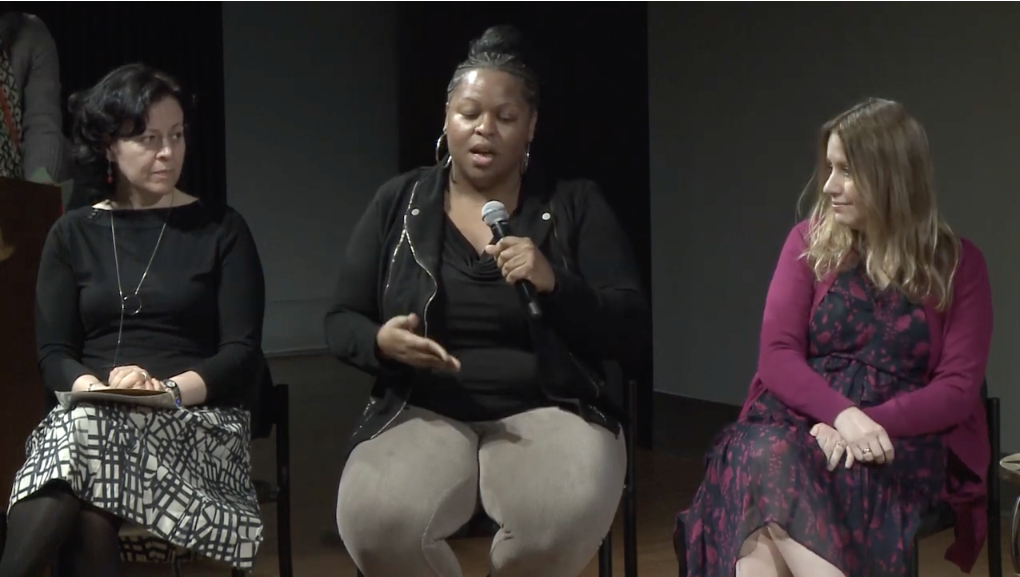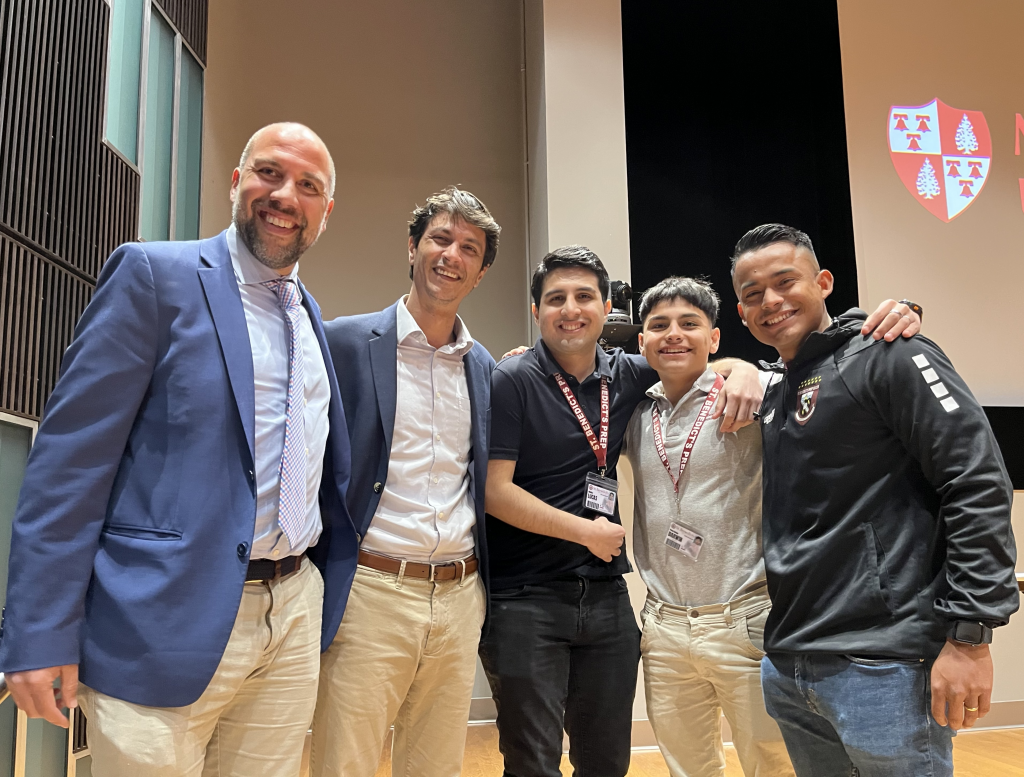Ciudad de los Niños (Bolivia-Italy): Documentary Screening and Discussion (April 17, 2023)
Posted in: CHSS News, Inserra Chair Events, Italian News and Events, School of Communication and Media

On April 17, 2023, the screening of the documentary La Ciudad de los Niños about a foster home and school founded in the 1960s by an Italian institution in collaboration with the Bolivian government provided a fruitful platform to address issues of foster care, access to education for challenged youth, and migration flows prompted by transnational initiatives of support.
Organized by the Inserra Chair in Italian and Italian American Studies in collaboration with several units on campus (see bottom of page) and held in the Presentation Hall of the School of Communication and Media, the event included a panel with guests coming from Bolivia and Italy, as well as local speakers from New York, Newark, and Montclair State University, who engaged in a comparative discussion about economic and socio-cultural interventions and collaborations.

The event also featured the Consul General del Estado Plurinacional de Bolivia in New York, Marko Michacao. He expressed enthusiastic support for this endeavor, and remains available for future collaborations in this and other areas, especially because of Montclair State University’s status as a Hispanic-Serving Institution. Before the event, he had a chance to briefly chat with Montclair State University President Jonathan Koppell and illustrate the current profile of the Bolivian community in the U.S. and more specifically the one in the NY-NJ area.

After the greetings of the Consul, and WLC Dept. Chair, Kathleen Loysen, the audience enjoyed the documentary La Ciudad del Niño, which tells the extraordinary story of Padre Antonio Berta (1927-2007), a visionary man from Bergamo, Italy, who arrived in Bolivia, in 1966 and devoted his entire life to abandoned children. In Cochabamba, he built La Ciudad del Niño, one of the largest foster homes and schools in the country. The film documents the experience of Padre Berta, the priests and the lay volunteers who have helped shape Bolivian society during four decades of educational reform, social engagement, and political activism.
Elena Bellina, one of the writers of the documentary, illustrated the long history of foster care in Bergamo dating back to the time of Pope John XXIII (1958-63). A native of the area, this pope was particularly invested in the support of poor children, and launched a program in Bolivia through Father Vavassori, who in turn was active in supporting orphans as early as after WWI. Bellina shared some historical pictures of the early development of La Ciudad de Los Niños, and then explained how she got involved in the writing of this history through the documentary, which effectively links two really faraway places like Bergamo and Cochabamba (6,417 miles!).
The panel continued with a very informative and moving testimony offered by Fulvio Diploma, current director of La Ciudad del Niño, who sketched the story of the institution from where the documentary left off. He highlighted the introduction of new programs such as the strategy of reintegration of children into the family of origin (supported by UNICEF); the temporary fostering on the part of local families; the creation of twelve self-sustained houses shared by small supervised groups of children on the La Ciudad campus; and a 24/7 open house for high-emergency situations. He illustrated current challenges (while the number of abandoned and neglected children in the system is lower the socio-economic reasons for their conditions are still the same) but also successful interventions (60-70% of the children in the emergency house go back to their families or extended families).
Father Sergio Gamberoni (Director, Migrant Office, Catholic Diocese, Bergamo, Italy) illustrated the demographic movements from Bolivia to Bergamo that were prompted by the La Ciudad project since 1990 (adoption, mixed couples, work, friendship). The resulting community – 1/6 of the local population, primarily female, and almost exclusively Catholic – is made of people eager to keep their cultural roots alive (through dances like morenadas, tobas, chacareras, etc.) and equally committed to work to support the families in Bolivia and be integrated locally. Despite some internal and medical challenges, the community is seen as a dynamic presence in Bergamo.
The respondents addressed issues linked to foster care and education in the US, New Jersey and on our very campus, in order. Svetlana Shpiegel (Associate Professor, Social Work and Child Advocacy Dept., Montclair State University) provided a snapshot of the foster care system in the U.S., a really large system (400,000 children any given year, primarily BIPOC), which is state-based even though some regulations are federal. She stated that the main difference with Bolivia is that the U.S. privileges non-relative or relative care over group care (only 10%): its goal is to find permanent caregivers (adoptive parents or relatives), as institutions do not allow children to thrive. Special attention in these days is given to older adolescents (17-21) ready to leave the system and to high-need children, but these are very challenging placements due to lack of qualified families for such a task.
Arian Craig (Director, Red Hawk Fellows) explained how Montclair State University supports students coming from the foster care system, or homeless students and students with no family (170 at the moment): she provides mentoring in housing, finances, and life skills at large during and beyond their experience on campus, and oversees programs that provide food, clothing, books, etc.. Finally, Mario Gallo (Director of Admissions, St. Benedict’s Preparatory School, Newark, NJ, USA) brought the story of an urban school that since 1868 has embraced children with challenging backgrounds and created opportunities for them in education as well as sport and the arts. That evening the school body was represented by a select group of international and Hispanic students including Bolivian ones who came to Newark as part of a partnership with a soccer organization in – not Cochabamba but – Santa Cruz (see photo on the right below)!
The audience was very taken by the stories shared by the panelists, and a woman from Bolivia inquired into ways of helping from the U.S. Equally interesting is the proposal to consider La Ciudad for a research project, as Svetlana Shpiegel suggested. Attending MSU students such as Silvana Wilson and Dante Romero commented that an event about Bolivia and Italy actually made them aware of the U.S. foster care system whose size bewildered them.
As Teresa Fiore remarked, “The words of Fulvio Diploma are the ones that will resonate for a while after this event: ‘My dream is that one day La Ciudad will disappear and that the children will all find a family. We know that this is not possible, though, and the hope is that La Ciudad can become a day center of family support towards reintegration.’ This is the hope for any foster care system, regardless of its geographical location,” Fiore concluded.
For more information see webpage.
Organized and sponsored by the Inserra Endowed Chair in collaboration with the Italian Program (Dept. of World Languages and Cultures), the Dept. of Social Work and Child Advocacy, and the Red Hawk Fellows at Montclair State University. In partnership with Fondazione Patronato San Vincenzo, Bergamo (Italy) and St. Benedict’s Preparatory School, Newark, NJ. The event is included in the series Dentro/Afuera: The Interconnections between Italian and Latin American/Spanish Cultures and linked to the research project Memoria Presente: The Common Spanish Legacy in Italian and Latin American Cultures.
Short link: https://tinyurl.com/MSUCiudad






